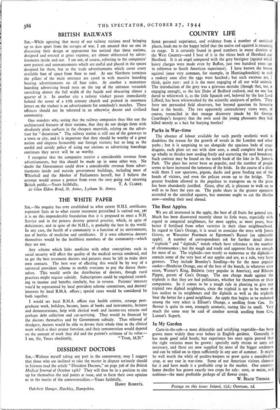BRITISH RAILWAYS
SIR,—While agreeing that many of our railway stations need bringing up to date apart from the ravages of war, I am amazed that no one in discussing their design or appearance has noticed that these stations, designed and erected at great expense, are almost obliterated by adver- tisements inside and out. I am not, of course, referring to the companies' own posters and announcements which are useful and placed in the spaces designed for them, but to the trade advertisements which cover every available foot of space from floor to roof. At one Northern terminus the pillars of the main entrance are cased in with massive hoarding bearing advertisements on all four sides. At another a monstrous hoarding advertising bread rests on the top of the entrance verandah stretching almost the full width of the facade and obscuring almost a quarter of it. In another city a railway viaduct passes immediately behind the tower of a 17th century church and painted in enormous letters on the viaduct is an advertisement for somebody's matches. These offences should not be tolerated in an otherwise decent and civilised community.
One wonders why, seeing that the railway companies thus blot out the architectural features of their stations, that they do not design them with absolutely plain surfaces in the cheapest materials, relying on the adver- tiser for "decoration." The railway station is still one of the gateways to a town or city, and it is important that they should be worthy of a great nation and .impress favourably our foreign visitors; but so long as the sordid and untidy policy of using our stations as advertising hoardings continues they never will be so worthy.
I recognise that the companies receive a considerable revenue from advertisements, but this should be made up in some other way. No • doubt the Government could draw a considerable revenue from adver- tisements inside and outside government buildings, including most of Whitehall and the Mother of Parliaments herself, but I believe the attempt would arouse a protest from even the easy going and unseeing
British public.—Yours faithfully, T. A. CLARKE. 20 Glen Eldon Road, St. Armes, Lytham St. Annes.


























 Previous page
Previous page